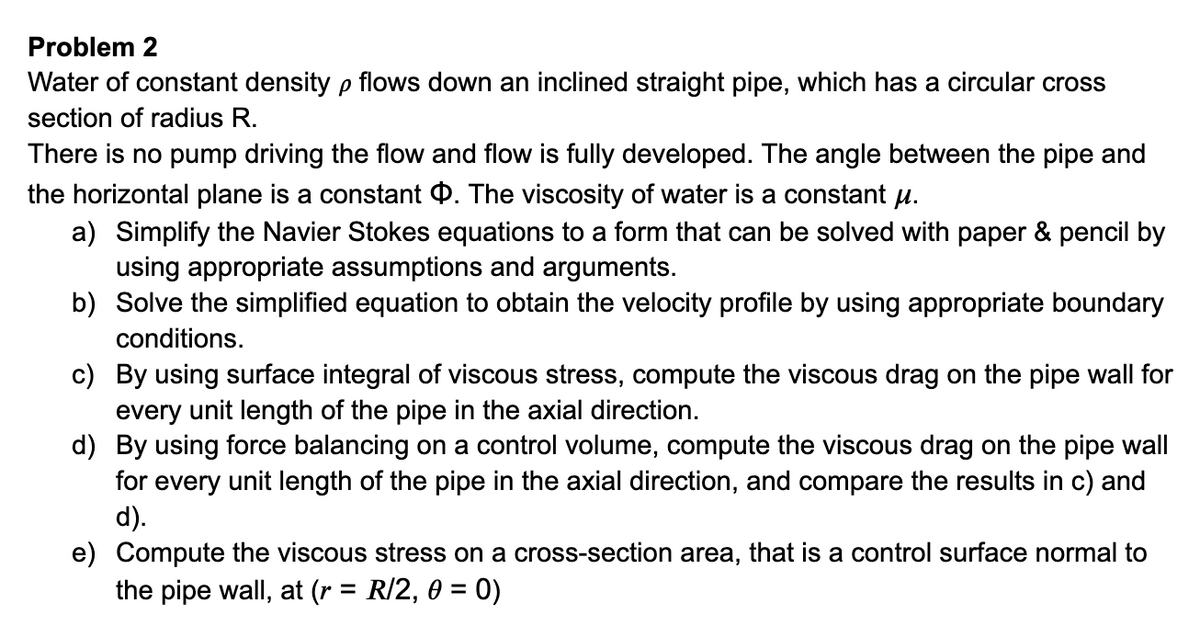Please give detailed explanations and show your work clearly - I will be using this to study for an upcoming exam. Please do as much as you can but don't worry if you cannot complete the entire problem. Thank you!
Please give detailed explanations and show your work clearly - I will be using this to study for an upcoming exam. Please do as much as you can but don't worry if you cannot complete the entire problem. Thank you!
Elements Of Electromagnetics
7th Edition
ISBN:9780190698614
Author:Sadiku, Matthew N. O.
Publisher:Sadiku, Matthew N. O.
ChapterMA: Math Assessment
Section: Chapter Questions
Problem 1.1MA
Related questions
Question
Please give detailed explanations and show your work clearly - I will be using this to study for an upcoming exam. Please do as much as you can but don't worry if you cannot complete the entire problem. Thank you!

Transcribed Image Text:Problem 2
Water of constant density p flows down an inclined straight pipe, which has a circular cross
section of radius R.
There is no pump driving the flow and flow is fully developed. The angle between the pipe and
the horizontal plane is a constant 4. The viscosity of water is a constant u.
a) Simplify the Navier Stokes equations to a form that can be solved with paper & pencil by
using appropriate assumptions and arguments.
b) Solve the simplified equation to obtain the velocity profile by using appropriate boundary
conditions.
c) By using surface integral of viscous stress, compute the viscous drag on the pipe wall for
every unit length of the pipe in the axial direction.
d) By using force balancing on a control volume, compute the viscous drag on the pipe wall
for every unit length of the pipe in the axial direction, and compare the results in c) and
d).
e) Compute the viscous stress on a cross-section area, that is a control surface normal to
the pipe wall, at (r = R/2, 0 = 0)
%3D
Expert Solution
This question has been solved!
Explore an expertly crafted, step-by-step solution for a thorough understanding of key concepts.
This is a popular solution!
Trending now
This is a popular solution!
Step by step
Solved in 3 steps with 9 images

Knowledge Booster
Learn more about
Need a deep-dive on the concept behind this application? Look no further. Learn more about this topic, mechanical-engineering and related others by exploring similar questions and additional content below.Recommended textbooks for you

Elements Of Electromagnetics
Mechanical Engineering
ISBN:
9780190698614
Author:
Sadiku, Matthew N. O.
Publisher:
Oxford University Press

Mechanics of Materials (10th Edition)
Mechanical Engineering
ISBN:
9780134319650
Author:
Russell C. Hibbeler
Publisher:
PEARSON

Thermodynamics: An Engineering Approach
Mechanical Engineering
ISBN:
9781259822674
Author:
Yunus A. Cengel Dr., Michael A. Boles
Publisher:
McGraw-Hill Education

Elements Of Electromagnetics
Mechanical Engineering
ISBN:
9780190698614
Author:
Sadiku, Matthew N. O.
Publisher:
Oxford University Press

Mechanics of Materials (10th Edition)
Mechanical Engineering
ISBN:
9780134319650
Author:
Russell C. Hibbeler
Publisher:
PEARSON

Thermodynamics: An Engineering Approach
Mechanical Engineering
ISBN:
9781259822674
Author:
Yunus A. Cengel Dr., Michael A. Boles
Publisher:
McGraw-Hill Education

Control Systems Engineering
Mechanical Engineering
ISBN:
9781118170519
Author:
Norman S. Nise
Publisher:
WILEY

Mechanics of Materials (MindTap Course List)
Mechanical Engineering
ISBN:
9781337093347
Author:
Barry J. Goodno, James M. Gere
Publisher:
Cengage Learning

Engineering Mechanics: Statics
Mechanical Engineering
ISBN:
9781118807330
Author:
James L. Meriam, L. G. Kraige, J. N. Bolton
Publisher:
WILEY